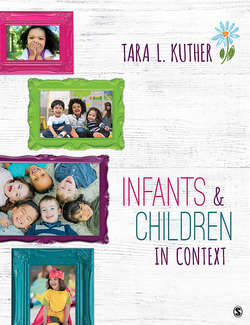Читать книгу Infants and Children in Context - Tara L. Kuther - Страница 33
На сайте Литреса книга снята с продажи.
Contexts of Development
ОглавлениеWhere did you grow up? Describe your childhood neighborhood. Did you play in a park or on a playground? Did you ride your bike outside? What was your elementary school like? Did you have access to technology such as tablets and computers? Did you learn to type in school? How large is your family? What were some of your family traditions? What holidays did you celebrate? Did you share family meals often? Your responses to these questions reveal aspects of your context.
Context refers to where and when a person develops. Context encompasses many aspects of the physical and social environment, such as family, neighborhood, country, and historical time period. It includes intangible factors, characteristics that are not visible to the naked eye, such as values, customs, ideals, and culture. In order to understand a given individual’s development, we must look to his or her context, including the subtle, less easily viewed, factors. For example, were you encouraged to be assertive and actively question the adults around you, or were you expected to be quiet and avoid confrontation? How large a part was spirituality or religion in your family’s life? How did religious values shape your parent’s childrearing practices and your own values? How did your family’s economic status affect your development? These questions examine a critical context for our development, home and family. However, we are embedded in many more contexts that influence us, and that we influence, such as our peer group, school, neighborhood or community, and culture (see the Lives in Context feature). Our development plays out within the contexts in which we live, a theme that we will return to throughout this book.
